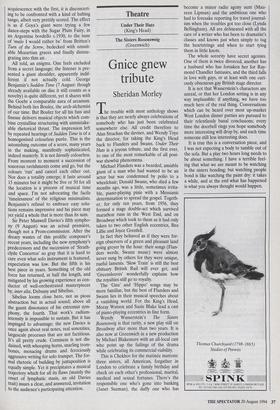Theatre
Under Their Hats (King's Head) The Sisters Rosensweig (Greenwich)
Gnice gnew tribute
Sheridan Morley
The trouble with most anthology shows is that they are nearly always celebrations of somebody who has just been celebrated somewhere else. All credit therefore to Alan Strachan the deviser, and Wendy Toye the director, for taking the King's Head back to Flanders and Swann. Under Their Hats is a joyous tribute, and the first ever, to one of the most remarkable of all post- war showbiz phenomena.
Michael Flanders was a bearded, amiable giant of a man who had wanted to be an actor but was condemned by polio to a wheelchair; Donald Swann, who died a few months ago, was a little, sometimes irrita- ble, piano-playing pixie with a Messianic determination to spread the gospel. Togeth- er, for only ten years, from 1956, they formed a stage double-act which survived marathon runs in the West End, and on Broadway which took to them as it had only taken to two other English eccentrics, Bea Lillie and Joyce Grenfell.
In fact they behaved as if they were for- eign observers of a green and pleasant land going greyer by the hour: their songs (Flan- ders words, Swann music) were almost never sung by others for they were unique, rueful laments. 'Slow Train' is still the best obituary British Rail will ever get, and `Greensleeves' wonderfully explains how the royalties still go to royalty.
The 'Gnu' and 'Hippo' songs may be more familiar, but the best of Flanders and Swann lies in their musical speeches about a vanishing world. For the King's Head, Moray Watson and Suzie Blake lead a cast of piano-playing eccentrics in fine form.
Wendy Wasserstein's The Sisters Rosensweig is that rarity, a new play still on Broadway after more than two years. It is also now at Greenwich in a new production by Michael Blakemore with an all-local cast who point up the failings of the drama while celebrating its commercial viability.
This is Chekhov for the matinee matrons: three sisters, all American, forgather in London to celebrate a family birthday and check on each other's professional, marital, medical and sexual fortunes. There's the responsible one who's gone into banking (Janet Suzman), the daffy one who has become a minor radio agony aunt (Mau- reen Lipman) and the ambitious one who had to foresake reporting for travel journal- ism when the troubles got too close (Lynda Bellingham). All are delineated with all the care of a writer who has been to dramatist's classes and knows just when simply to tug the heartstrings and when to start tying them in little knots.
The whole sorority have secret agonies. One of them is twice divorced, another has a husband who has forsaken her for Ray- mond Chandler fantasies, and the third falls in love with gays, or at least with one curi- ously obnoxious gay British stage director.
It is not that Wasserstein's characters are unreal, or that her London setting is in any way implausible: if anything, we have too much here of the real thing. Conversations which can be heard over most up-market West London dinner parties are pursued to their relentlessly banal conclusions; every time the doorbell rings you hope somebody more interesting will drop by, and each time someone still less interesting does.
It is true this is a conversation piece, and I was not expecting a body to tumble out of the sofa. But a play two hours long needs to be about something. I have a terrible feel- ing that what we are meant to be watching is the sisters bonding; but watching people bond is like watching the paint dry: it takes a while, and at the end what has happened is what you always thought would happen.


















































 Previous page
Previous page